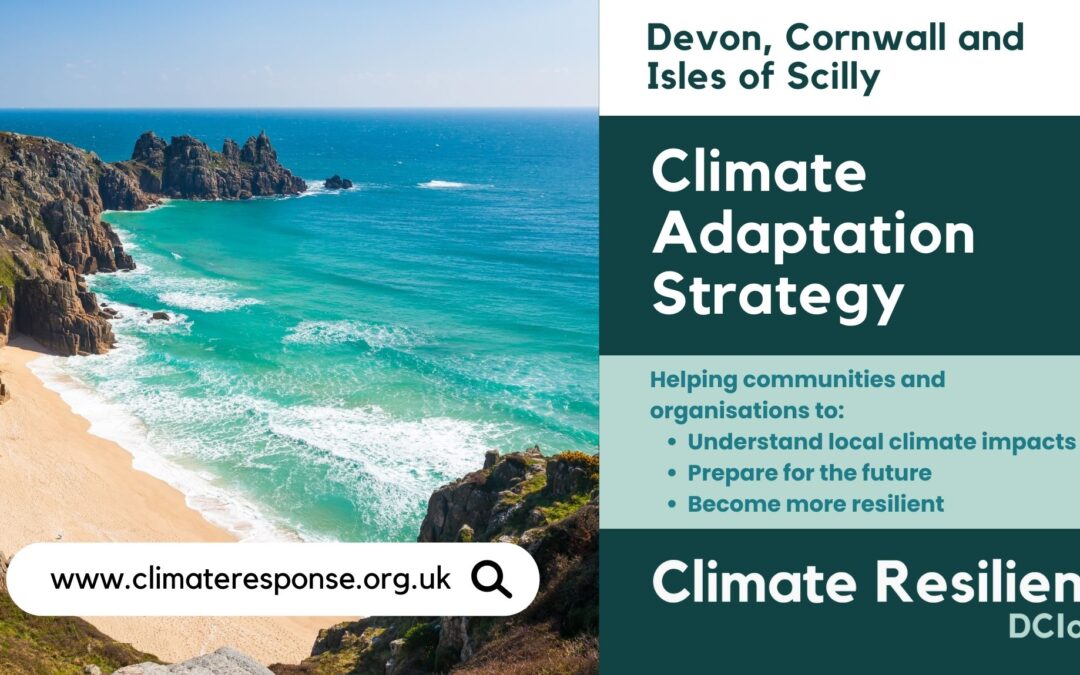Launch of Climate Adaptation Strategy to help region prepare for a warmer world
The Devon, Cornwall and Isles of Scilly (DCIoS) Climate Adaptation Strategy has been published this week.
It’s purpose is to help to ensure that the region can make the changes needed to cope with the worst effects of climate change.
A consultation earlier this year saw 76% of respondents expressing concern about climate change, while 69% said they have felt the effects of climate change already.
Mitigation & Adaptation
To respond effectively to the climate crises, it is vital that strategies are put in place to deal with both the cause of rising greenhouse gases and their effect on our communities. This is called mitigation and adaptation respectively.
Mitigation focuses on tackling the causes of climate change to make the inevitable impacts of rising global temperatures less severe by reducing the emission of greenhouse gases.
Adaptation is the process of adjusting to the negative impacts and opportunities of climate change that we are already seeing and can be expected in the future.
Actions
The Strategy sets out risks to the region from climate impacts, the conditions for everyone to act on adapting to climate change together, and priority actions for regional collaboration over the next five years.
Priority short-term actions for local government and public institutions include:
- building and developing resilience partnerships to ensure the co-ordination of arrangements for an emergency
- developing a climate change public awareness campaign
- providing information to enable adaptation planning by businesses and householders.
Actions for organisations, community groups and individuals are also set out, such as the formation of local Community Resilience Groups.
All actions align with broader ‘strategic directions’ for the natural environment, infrastructure, health and the built environment, business and industry, and other cross cutting themes.
Examples
The world has already experienced warming of around 1.1°C above pre-industrial levels (1850-1900) and further temperature changes are expected in the future. Significant climate impacts are therefore inevitable.
For example, if global temperatures increase by 4°C by 2100, projections suggest sea level in the DCIoS region is very likely to rise by between 0.24m and 0.38m by 2050 relative to the 1981 – 2000 average. This puts coastal and low-lying communities at risk.
The risks to properties from coastal erosion are projected to increase over time. Sixty-seven properties are at risk over the next 20 years. This rises to 122 properties at risk in 20 to 50 years’ time.
Climate change is projected to increase winter rainfall and increase the intensity and frequency of storm events, furthering the region’s vulnerability. This means that events like Storm Ciaran – which affected Devon earlier this month and saw more than 80 reported incidents of fallen trees, flooded roads and landslips on local roads – are likely to become more common.
Nationally, public water supplies will need more than 3.4 billion extra litres of water per day by 2050, impacting our rural economy as crop failures will become more frequent in response to droughts.
Other projected climate impacts include drier, hotter summers with more heatwaves; increased risk of extreme events like wildfires and storms; a shift in the growing seasons; and changes to pest and disease pressures.
If the region does not plan to adapt to climate change, it will face impacts to the economy, tourism, public health, infrastructure, wildlife and more.
The Adaptation Strategy has been developed by the DCIoS Climate Impacts Group. This is a partnership of strategic organisations, including local authorities, that is chaired by the Environment Agency – with the assistance of RSK, an engineering and environmental consultancy. A public consultation took place in May and June.
Findings from 214 responses to the consultation were that 80% either “support the strategy” or “support some parts of the strategy but not others”.
Overall, respondents recognised that immediate action on climate change and adaptation is needed, and that the Strategy is comprehensive and evidence-based. Feedback from the consultation has been considered and incorporated into the final Strategy.
Over the coming months members of the Devon Climate Emergency partnership will consider endorsing the Strategy.
Comment
Mark Rice – Area Director for Devon, Cornwall and Isles of Scilly, Environment Agency said: “We’d like to thank everyone who responded to the consultation. It is clear that communities in Devon, Cornwall and the Isles of Scilly are already living with increased risks due to a changing climate and are concerned about this. Therefore, it is key that a coordinated approach is taken by regional bodies tasked with managing the risk posed by climate change and responding to hazards. The Action Plan in the Strategy sets out what needs to be done over the next five years.”
CEO at Westcountry Rivers Trust Dr Laurence Couldrick said: “We must support our rivers in the face of climate change pressures and the increase in flooding, drought, water pollution and aquatic biodiversity decline. It’s vital we build catchment resilience through slowing and storing water within the landscape and buffer agriculture and pollutant impacts on our freshwater environments.”
Read the Strategy
Find out more about the Strategy, consultation report, and climate adaptation resources for local policy makers, organisations, communities, and individuals at climateresilient-dcios.org.uk/view-adaptation-strategy.

